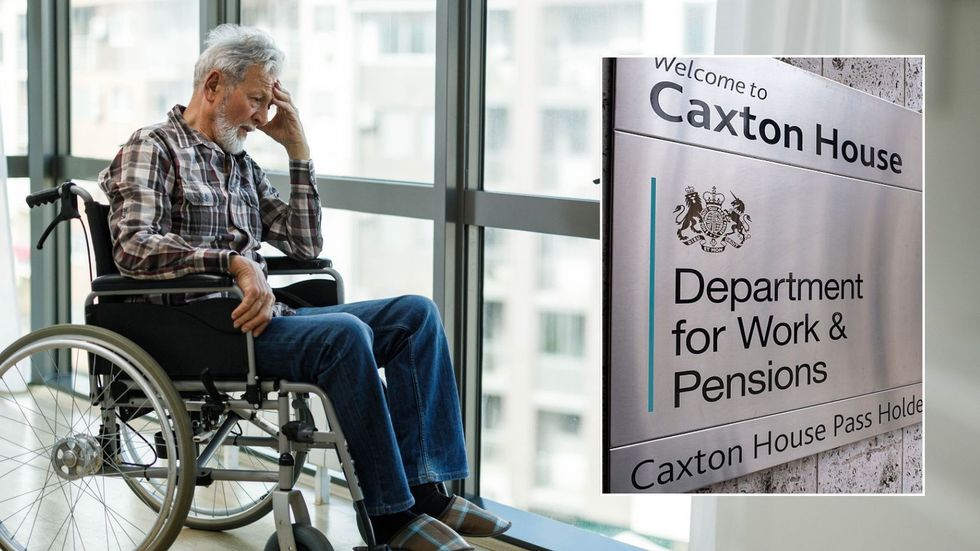DWP's 'catastrophic' reform to PIP to see disabled Britons lose up to £5,750 a year: 'Distressing!'

Stella Creasey says cutting benefits will not 'magically' create jobs for unemployed |
GB NEWS

Labour are preparing to implement changes to the DWP, which will impact claimants of benefits such as PIP
Don't Miss
Most Read
Labour welfare reforms targeting Personal Independence Payment (PIP) could leave 800,000 people with mental health conditions facing severe financial hardship, according to stark new research.
The Money and Mental Health Policy Institute, founded by Martin Lewis, warns of a "triple whammy" impact that would devastate recipients' finances, mental wellbeing and employment prospects.
The charity conducted an in-depth survey of 227 people with mental health conditions who currently receive PIP. Their findings paint an alarming picture of the consequences if proposed eligibility restrictions proceed.
Under the Government's March announcement, qualifying for the daily living component would require scoring four or more points on a single task, rather than eight points across multiple activities as currently required.

Charities are urging the Government to reconsider reforms to PIP
|GETTY
The research reveals that 97 per cent of survey respondents believe the PIP changes would have a "significant negative impact" on their mental health. Some participants reported experiencing panic attacks or suicidal thoughts merely from the prospect of losing their benefits.
Some 24 per cent of those surveyed expect to lose PIP entirely under the new rules, whilst another 39 per cent remain uncertain about their eligibility.
Those currently receiving the enhanced rate face potential annual income drops exceeding £5,750, while standard rate recipients could lose more than £3,850 yearly.
The new eligibility criteria would fundamentally alter how people qualify for support. Currently, applicants accumulate points across various daily living tasks including meal preparation, dressing, communication and budget management.
Do you have a money story you’d like to share? Get in touch by emailing money@gbnews.uk.
Under the proposed system, individuals will be required to demonstrate significant difficulty with a single specific task to meet the four-point threshold. This represents a substantial tightening of access requirements that the Money and Mental Health Policy Institute estimates will affect 800,000 current recipients.
Around one-third of those expecting to lose benefits currently receive the enhanced rate due to high support needs. These individuals face the steepest financial cliff, with annual income reductions of over £5,750.
The remainder, on standard rate PIP, still confront significant hardship with projected yearly losses exceeding £3,850.The survey exposes how losing PIP would force recipients to make devastating choices about essential support and basic necessities.
Around 82 per cent of respondents who use their benefits for counselling, therapy or personal care say they would significantly reduce or stop this spending entirely if they lose PIP.
"I feel incredibly distressed at the prospect of losing additional money that goes towards therapy. The amount I get is not covering all the additional costs that come with mental health difficulties as it is," one participant revealed.
The impact extends to fundamental living costs, with 85 per cent saying they would need to significantly cut grocery spending. Some 76 per cent report they would struggle to maintain essential household bills.
LATEST DEVELOPMENTS:
 Work and Pensions Secretary Liz Kendall has proposed these alterations to cut the PIP budget by £5billion | PA
Work and Pensions Secretary Liz Kendall has proposed these alterations to cut the PIP budget by £5billion | PAThese cumulative pressures create what researchers describe as a devastating spiral for people's mental health and daily survival.
Helen Undy, Chief Executive of the Money and Mental Health Policy Institute, delivered a stark warning about the reforms' contradictory nature. "The Government says its welfare reforms will help more people move into work. But you don't do that by depriving people of a critical financial lifeline that helps them stay well," she said.
The research reveals that approximately one in five survey respondents currently receiving PIP are employed. However, 63 per cent of this working group say they would need to reduce hours or leave employment entirely if they lost their benefits.
"PIP pays for the private therapy which keeps my mental health at a functioning level most of the time. Without these I doubt I could even manage the permitted work hours (14 hours per week) that I do," one respondent explained.
More From GB News










